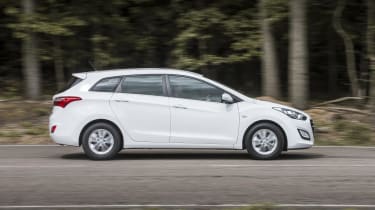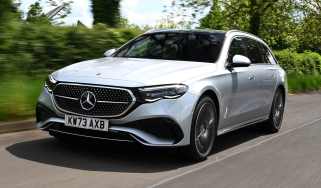Hyundai i30 Tourer estate (2012-2017) - MPG, running costs & CO2
Diesel models offer low tax and fuel bills
If you want the best possible fuel economy from the Hyundai i30, the diesel engines generally outperform the petrols. The 1.6-litre CRDi produces 109bhp and promises 72mpg if fitted with a manual gearbox. It’s relatively clean, too, with CO2 emissions of just 102g/km promising a £20 annual tax bill.
CO2 emissions and fuel economy both suffer if you go for an automatic gearbox. Emissions jump slightly to 109g/km of CO2, which increases your tax bill, while the lower miles-per-gallon figure of 67mpg will increase your fuel costs. This engine is available in entry-level S trim, mid-range S trim and also NAV trim. The i30 Premium, meanwhile, has a choice of two different engines.
The Hyundai i30 Tourer also comes with a small petrol engine. It’s not the most popular option here in the UK, but it’s the cheapest version of this car – the entry-level S trim with this petrol engine costs just £16,895, which is cheaper than nearly all rivals apart from the Vauxhall Astra Sports Tourer.
This petrol engine is a 118bhp 1.6-litre. It’s relatively inefficient, claiming an unimpressive 43mpg economy and emitting a barely adequate 150g/km of CO2. This is probably the weaker engine in a car with such good diesel options, but drivers who do shorter journeys could find it more cost-effective.
More reviews
The Hyundai i30 Tourer Premium comes with its own engine, a 126bhp diesel. This starts at £23,395 for the manual and £24,695 for the automatic, with claimed fuel economy of 71 and 64mpg respectively. Ultimately, when you compare its figures to those of the VW Golf and Ford Focus competitors, the i30 Tourer isn’t the most frugal small estate on the market.
Insurance group
Insurance ratings for the Hyundai i30 Tourer range from group 9 for the very basic version up to group 13 for the Premium model. Compared to similar cars such as the Ford Focus estate, which has insurance groups ranging from 11 to 22, this is a narrow spread. The VW Golf estate’s cheapest-to-insure model starts at group 7, which could make it cheaper to run for new or inexperienced drivers.
Warranty
All Hyundai cars come with a five-year, unlimited mileage warranty, which is significantly more cover than almost anything else on the road. The only car that comes close is the 100,000-mile, seven-year cover offered with the Kia Cee’d. It’s worth noting that Hyundai’s offering includes five years of roadside assistance, five years of annual vehicle health checks, and an anti-perforation warranty that protects against corrosion damage. We consider this to be one of the best packages in the sector.
Servicing
The service interval for all Hyundai i30 cars is 20,000 miles – more than that for the Ford Focus estate (which needs servicing every 12,500 miles). Hyundai’s pre-paid servicing package is fairly good value. Prices vary depending on whether you’ve chosen a petrol or diesel i30 and how long you want the plan to last. If you have a diesel car, a three-year/30,000-mile plan costs £450 while the five-year/50,000-mile plan is £750. For the petrol, those prices are £350 and £650 respectively.
Which Is Best?
Cheapest
- Name1.5T GDi 48v Hybrid Advance 5dr
- Gearbox typeManual
- RRP£25,275
Most Economical
- Name1.5T GDi 48v Hybrid Advance 5dr DCT
- Gearbox typeSemi-auto
- RRP£26,475
Fastest
- Name1.5T GDi 48v Hybrid Advance 5dr
- Gearbox typeManual
- RRP£25,275














